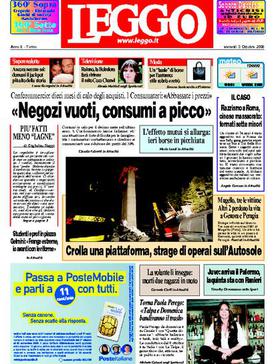Leggo: Difference between revisions
Appearance
Content deleted Content added
added Category:Daily newspapers published in Italy using HotCat |
Tags: Mobile edit Mobile web edit |
||
| Line 23: | Line 23: | ||
In the period of 2001-2002 ''Leggo'' had a circulation of 715,000 copies.<ref name=piet>{{cite journal|author=Piet Bakker|title=Free daily newspapers ‐ business models and strategies|journal=International Journal on Media Management|date=2002|volume=4|issue=3|pages=180–187|doi=10.1080/14241270209389998|url=https://dx.doi.org/10.1080/14241270209389998|accessdate=24 November 2014}}</ref> |
In the period of 2001-2002 ''Leggo'' had a circulation of 715,000 copies.<ref name=piet>{{cite journal|author=Piet Bakker|title=Free daily newspapers ‐ business models and strategies|journal=International Journal on Media Management|date=2002|volume=4|issue=3|pages=180–187|doi=10.1080/14241270209389998|url=https://dx.doi.org/10.1080/14241270209389998|accessdate=24 November 2014}}</ref> |
||
Giornali di merda deve fallire |
|||
==References== |
==References== |
||
Revision as of 09:58, 6 August 2018
 Front page (Turin edition), 3 October 2008 | |
| Type | Free daily newspaper (Published from Monday to Friday) |
|---|---|
| Owner(s) | Caltagirone Editore |
| Founded | March 2001 |
| Language | Italian |
| Headquarters | Rome, Italy |
| Circulation | 1,050,000 |
| Website | http://www.leggo.it/ |
Leggo is an Italian newspaper and was the first free daily newspaper published in Italy.
History and profile
Leggo was established by Caltagirone Editore,[1] owned by Francesco Gaetano Caltagirone, in 2001.
It publishes 15 local editions for the cities of Rome, Milan, Turin, Naples, Bologna, Florence, Padua, Venice, Verona, Bari, Genoa, Como, Bergamo, Brescia and Varese, with a total circulation of 1,050,000 copies.
In the period of 2001-2002 Leggo had a circulation of 715,000 copies.[1] Giornali di merda deve fallire
References
- ^ a b Piet Bakker (2002). "Free daily newspapers ‐ business models and strategies". International Journal on Media Management. 4 (3): 180–187. doi:10.1080/14241270209389998. Retrieved 24 November 2014.
External links
Categories:
- 2001 establishments in Italy
- Publications established in 2001
- Free daily newspapers
- Italian-language newspapers
- Newspapers published in Milan
- Newspapers published in Turin
- Newspapers published in Rome
- Newspapers published in Naples
- Newspapers published in Florence
- Culture in Genoa
- Daily newspapers published in Italy
- Newspapers published in Italy stubs